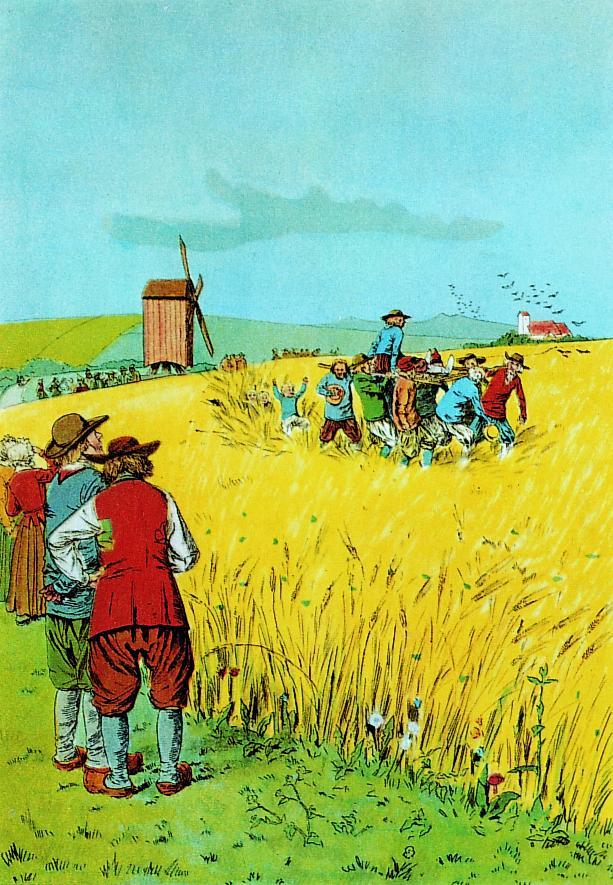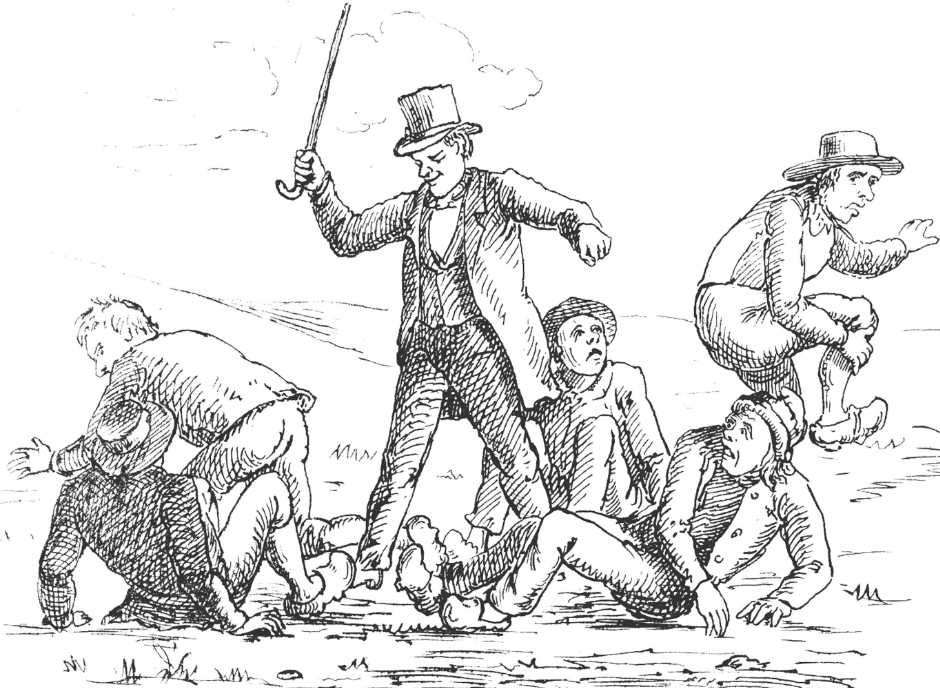|
Fünsing
Fünsing is a fictional German " village of fools". The 19th-century ''Deutsches Wörterbuch'' by the Brothers Grimm defines the word Fünsinger as a silly person, a simpleton whose actions provoke laughter; Latin: ''baburnus'', '' stultus'', and compares the word with " Schildburger". Making fun of peasants was common in 16th-century German drama, drawing a contrast between smart and well-mannered city dwellers and stupid and clumsy peasants. Fünsing is best known from two by the 16th-century German poet and playwright Hans Sachs: "Der Roßdieb zu Fünsing" ("A Horse Thief from Fünsing") and "Die Fünsinger Bauern" ("Peasants of Fünsing") (1558). In the first one, one of Sachs' best-known pieces, the caught horse thief defends himself by arguing that he is no more dishonest than the judges, who, he asserts, would do the same if they had the opportunity. The judges let him go after he promises to come back after the harvest to be hanged. The second one tells of the stupidity ... [...More Info...] [...Related Items...] OR: [Wikipedia] [Google] [Baidu] |
Hans Sachs
Hans Sachs (5 November 1494 – 19 January 1576) was a German ''Meistersinger'' ("mastersinger"), poetry, poet, playwright, and shoemaking, shoemaker. Biography Hans Sachs was born in Nuremberg (). As a child he attended a singing school that was held in the church of Nuremberg. This helped to awaken in him a taste for poetry and music.2009 Jean Henri Merle D'Aubign, History of the Great Reformation of the Sixteenth Century in Germany, Switzerland. General Books His father was a tailor. He attended Latin school () in Nuremberg. When he was 14 he took up an apprenticeship as a shoemaker. After the apprenticeship, at age 17, he was a journeyman and set out on his Journeyman years (''Wanderjahre'' or ''Walz''), that is, travelling about with companions and students. Over several years he worked at his craft in many towns, including Regensburg, Passau, Salzburg, Munich, Osnabrück, Lübeck, and Leipzig. In 1513 he reached the small town of Wels, where he remained for a time, devo ... [...More Info...] [...Related Items...] OR: [Wikipedia] [Google] [Baidu] |
Village Of Fools
A town of fools is the base of a number of joke cycles found in various cultures. Jokes of these cycles poke fun at the stupidity of the inhabitants of a real or fictional populated place (village, town, region, etc.). In English folklore the best known butt of jokes of this type are the Wise Men of Gotham. A number of works of satire are set in a town of fools. The ''Motif-Index of Folk-Literature'' includes the motif J1703: "Town (country) of fools". Archetypal fools by place of residence *Wise Men of Gotham hail from the village of Gotham, Nottinghamshire *German Schildbürger are residents of the fictional town of Schilda (as opposed to the actual Schilda municipality). Stories about them originated from a 1597 book ''Das Lalebuch'' about the residents of a fictional town of Laleburg *Greek residents of Abdera. The ''Philogelos'', a Greek-language joke book compiled in the 4th century AD, has a chapter dedicated to jokes about dumb Abderans. **Example: An Abderan sees a eu ... [...More Info...] [...Related Items...] OR: [Wikipedia] [Google] [Baidu] |
Molbo Story
A Molbo story is a Danes, Danish folktale of the "town of fools" type about the people of Mols, who live in eastern Jutland near the town of Ebeltoft. In these tales the Molboes are portrayed as a simple folk, who act foolishly while attempting to be wise. History ''Molbohistorier'' (Molbo stories) were handed down by generations of Danes before finally appearing in print. Christian Elovius Mangor, who by permission of the Denmark, Danish monarch Christian VII of Denmark, Christian VII had started a printing press in Viborg, Denmark, Viborg, published the first collection, ''Tales of the well-known Molboes' wise and brave actions'', in 1771. A second edition followed in 1780. Over the years Molbo stories have been published in books for adults and children in several languages, including Danish language, Danish, Norwegian language, Norwegian and English language, English. Similar narratives are found in other cultures. England, for instance, has "Lazy Jack" and "The Wise Men o ... [...More Info...] [...Related Items...] OR: [Wikipedia] [Google] [Baidu] |
Deutsches Wörterbuch
The ''Deutsches Wörterbuch'' (; "German Dictionary"), abbreviated ''DWB'', is the largest and most comprehensive dictionary of the German language in existence.Synopsis of the ''Deutsches Wörterbuch'' at the Language Research Centre, Berlin-Brandenburg Academy of Sciences and Humanities, retrieved 27 June 2012.Clifford Wunderlich ''Deutsches Wörterbuch von Jacob und Wilhelm Grimm'' , Andover-Harvard Theological Library, Harvard University Divinity School, April 2012. retrieved 27 June 2012. Encompassing modern |
Brothers Grimm
The Brothers Grimm ( or ), Jacob Grimm, Jacob (1785–1863) and Wilhelm Grimm, Wilhelm (1786–1859), were Germans, German academics who together collected and published folklore. The brothers are among the best-known storytellers of Oral tradition, folktales, popularizing stories such as "Cinderella" ("), "The Frog Prince (story), The Frog Prince" (""), "Hansel and Gretel" ("), "Town Musicians of Bremen" (""), "Little Red Riding Hood" (""), "Rapunzel", "Rumpelstiltskin" (""), "Sleeping Beauty" (""), and "Snow White" (""). Their first collection of folktales, ''Grimms' Fairy Tales, Children's and Household Tales'' (), was first published in 1812. The Brothers Grimm spent their formative years in the town of Hanau in the Landgraviate of Hesse-Kassel. Their father's death in 1796 (when Jacob was 11 and Wilhelm 10) caused great poverty for the family and affected the brothers many years after. Both brothers attended the University of Marburg, where they developed a curiosity about ... [...More Info...] [...Related Items...] OR: [Wikipedia] [Google] [Baidu] |
Schwank (comedy)
In German-speaking cultures, () is a genre of short funny tale, verse, song, play, opera, etc. In German, common meanings for the word are "prank", "funny tale", told for entertainment. The (1966) offers a distinction of from other forms of comedy: delivers light, harmless, carefree humor, which distinguishes it from comedy, which ridicules something; from , which offers much hilarity; and from farce ( :de:Posse), with its crude boisterousness. Other German types of literary and scenic art involving comedy include the , , , , and . See also *Fabliau A ''fabliau'' (; plural ''fabliaux'') is a comic, often anonymous tale written by jongleurs and clerics in France between c. 1150 and 1400. They are generally characterized by sexual and scatological obscenity, and by a set of contrary attitud ... * Facetia References {{reflist External links * :de:Kategorie:Schwank * :de:s:Kategorie:Schwank Culture of Germany Culture of Austria Comedy genres Theatrical genres Sati ... [...More Info...] [...Related Items...] OR: [Wikipedia] [Google] [Baidu] |
German Humour
German humour is the conventions of comedy and its cultural meaning within the country of Germany. German humour encompasses traditions such as Kabarett and other forms of satire as well as more recent trends such as TV shows and stand-up comedy. Culture German humour often follows many conventions which, due to similarities in cultural perception of events and day-to-day life (and other such universal themes which may be discussed through comedy), may be readily interpreted by natives of other countries. Common joke themes and forms Scatological humour Alan Dundes in his book ''Life Is Like a Chicken Coop Ladder: A Portrait of German Culture Through Folklore'' suggests that the prominence of scatological humour in German culture stems from the "Teutonic parents' overemphasis on cleanliness". Political satire in magazines ''Titanic_(magazine), Titanics practical jokes have drawn some international attention: In 2000, a ''Titanic'' prank led to the 2006 FIFA World Cup#H ... [...More Info...] [...Related Items...] OR: [Wikipedia] [Google] [Baidu] |



